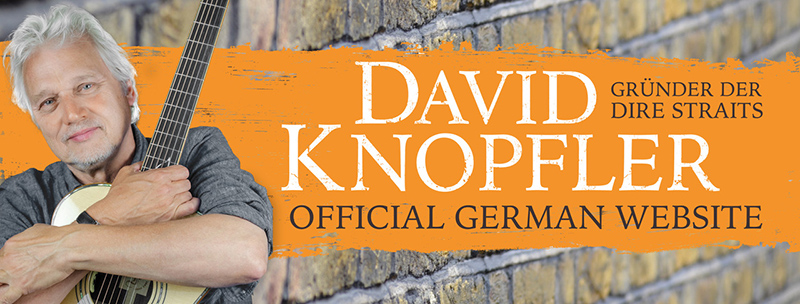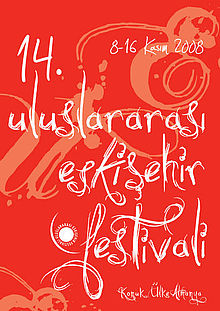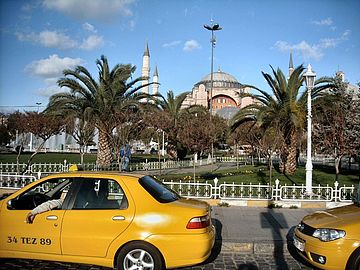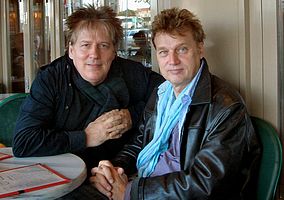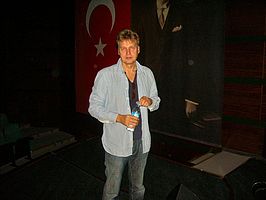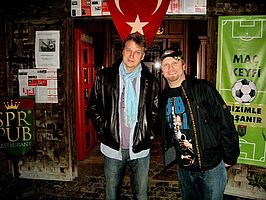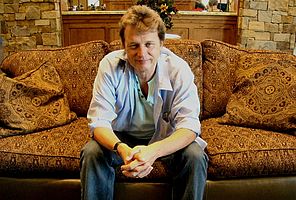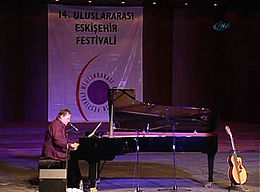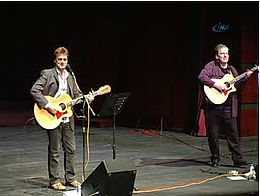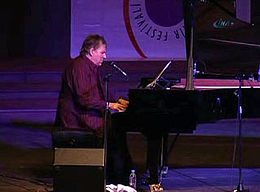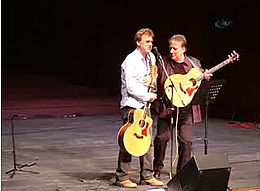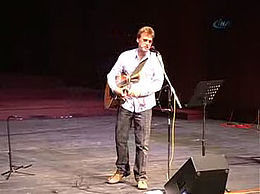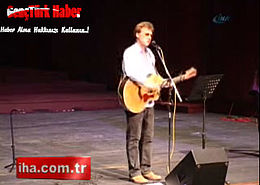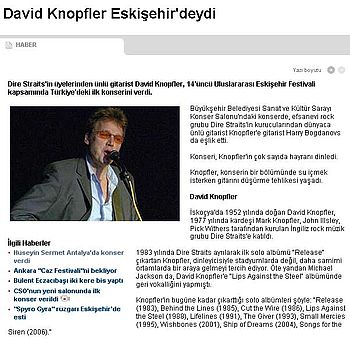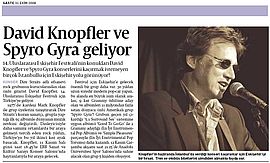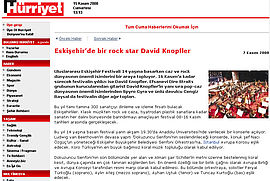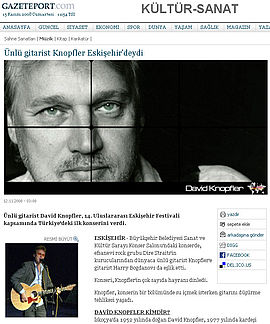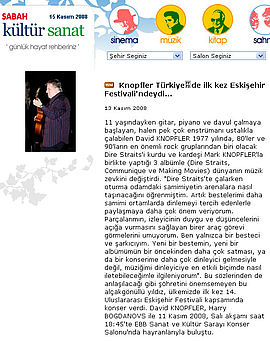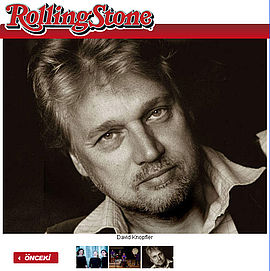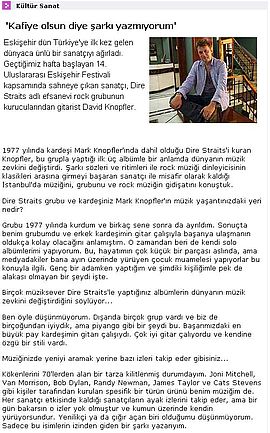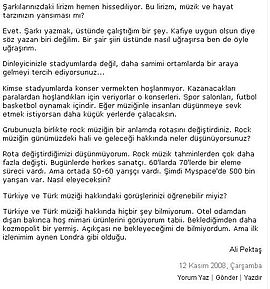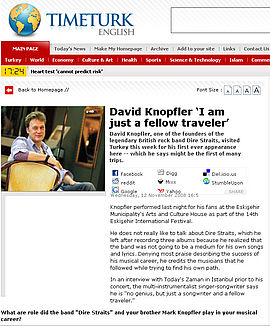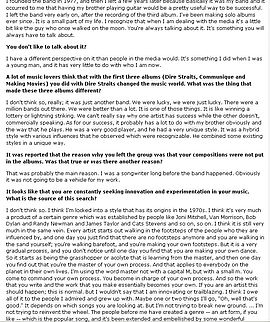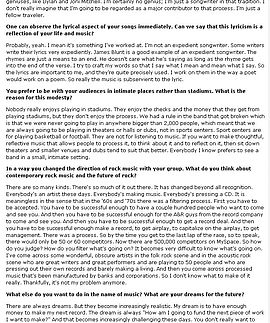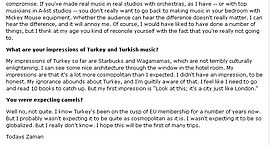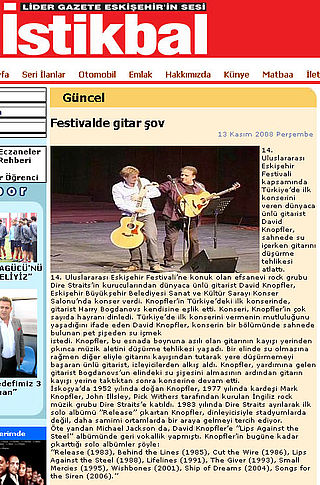Türkei- und Kanadatour - David vom 20.11.2008
Gerade sind wir zurück von einem kleinen, grandiosen Konzert in der Türkei, wo Harry Bogdanovs und ich vor 530 Zuschauern in einem ausverkauften Theater in Eskisehir spielten. Wir alle hatten eine super Zeit und haben es genossen, an diesem herrlichen Platz aufzutreten! Die Blaue Moschee in Istanbul kann ebenfalls nicht genug hervorgehoben werden - ein unglaubliches architektonisches Zeugnis aus dem 17. Jahrhundert.
Ich hoffe, dass wir nächstes Jahr wieder eingeladen werden. Danke an alle für die exzellente Organisation, das nette Hotel und die freundliche Hilfe. Gleichzeitig ein verspätetes aber nicht weniger enthusiastisches Dankeschön an alle in Kanada, die uns so herzlich Willkommen geheißen und für unser Wohl gesorgt haben. Ein großes Danke geht speziell an Charles und Gavin (dessen ausverkauftes Festival in Edmonton ebenfalls eine Freude für uns war!). Hurra!
Die nächsten möglichen Tourdaten - genauer gesagt eine Europa-Tour - sind für den April nächsten Jahres geplant (zumindest hoffe ich das), und dies möglicherweise mit einer Fünf-Mann-Band! Allerdings warte ich noch einige Termine bzw. deren Bestätigung durch Sounds Promotion Deutschland ab, ob das überhaupt machbar ist. Falls irgendwelche europäischen Promoter Interesse haben: bitte setzt euch entweder mit mir oder direkt mit Sounds Promotion in Verbindung.
Wenn ich schon gerade dabei bin, meine Dankesrunden zu drehen: Danke an Celine aus der "Denmark Street" (London) für die hervorragende Arbeit an meiner "Breedlove" sowie an meiner "Taylor 12".
Ich habe ein oder zwei Lieder mit einem Freund namens Callum Adamson geschrieben. Wir hatten eine kleine Session am vergangenen Sonntag, die wirklich interessante Früchte getragen hat. Zusammen mit dieser Session und dem Material, das ich mit Mack Starks und Harry Bogdanovs geschrieben habe, verspricht das nächste Album schon jetzt sehr spannend zu werden.
Dann habe ich in letzter Zeit mehrmals den großen Teich überquert und werde bald auch darüber Bericht erstatten.
Weitere Informationen gibt es hier ...
und hier ...
sowie bei Myspace.
Tschüs, DK :)
-----
Just back from an excellent little concert in Turkey - where Harry Bogdanovs and I played to a sold out theatre of 530 people in Eskisehir, where a grand time was had by all. Lovely place to play. The Blue Mosque in Istanbul can't be over-hyped either... amazing piece of 17th century architecture. Hope we get invited back next year. Thanks to everyone there for excellent organisation, nice hotel and friendly help. Similarly a belated but no less enthusiatic thanks to everyone in Canada who made us feel so welcome and comfortable there on our mini-tour and especially Charles and Gavin (who's sold out Festival Theatre in Edmonton was also such a joy to play). Yay!
The next likely dates in the diary will be April 2009 - European Tour (I hope) and possibly with a five piece fully plugged band - but I'm awaiting some dates and confirmation from Sounds-Promotion in Germany that it's doable. If any Eurropean Promoters are interested - please get in touch either with me or Sounds Promotion directly
While on my thank you rounds - thanks to Celine in Denmark Street for setting up my lovely Breedlove six string custom and the excellent work on my Taylor 12 string too.
I've been writing a tune or two with a chap called Callum Adamson - we had a wee session on Sunday just gone, which bore really interesting fruit. So, what with that, and the stuff I've written with Mack Starks, and last but anything but least, Harry Bogdanovs - the next record (when Harry and I get down to recording it) should prove to be really exciting.
Been zapping backwards and forwards across the Atlantic a lot in recent times - should have more to report on that soon.
There is also further information at david-knopfler.de and also at Myspace
Cheers, DK :)
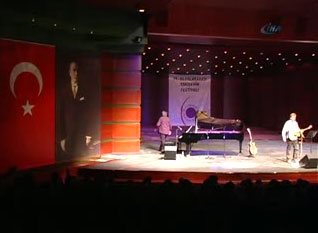
Im Klartext hier noch einmal:
David Knopfler ‘I am just a fellow traveler’
David Knopfler, one of the founders of the legendary British rock band Dire Straits, visited Turkey this week for his first ever appearance here -- which he says might be the first of many trips.
Knopfler performed last night for his fans at the Eskişehir Municipality's Arts and Culture House as part of the 14th Eskişehir International Festival.
He does not really like to talk about Dire Straits, which he left after recording three albums because he realized that the band was not going to be a medium for his own songs and lyrics. Denying most praise describing the success of his musical career, he credits the musicians that he followed while trying to find his own path.
In an interview with Today's Zaman in İstanbul prior to his concert, the multi-instrumentalist singer-songwriter says he is "no genius, but just a songwriter and a fellow traveler."
What are role did the band "Dire Straits" and your brother Mark Knopfler play in your musical career?
I founded the band in 1977, and then I left a few years later because basically it was my band and it occurred to me that having my brother playing guitar would be a pretty useful way to be successful. I left the band very early on, after the recording of the third album. I've been making solo albums ever since. It is a small part of my life. I recognize that when I am dealing with the media it's a little bit like the guy who once walked on the moon. You're always talking about it. It's something you will always have to talk about.
You don't like to talk about it?
I have a different perspective on it than people in the media would. It's something I did when I was a young man, and it has very little to do with who I am now.
A lot of music lovers think that with the first three albums (Dire Straits, Communique and Making Movies) you did with Dire Straits changed the music world. What was the thing that made these three albums different?
I don't think so, really; it was just another band. We were lucky, we were just lucky. There were a million bands out there. We were better than a lot. It is one of those things. It is like winning a lottery or lightning striking. We can't really say why one artist has success while the other doesn't, commercially speaking. As for our success, it probably has a lot to do with my brother obviously and the way that he plays. He was a very good player, and he had a very unique style. It was a hybrid style with various influences that he observed which were recognizable. He combined some existing styles in a unique way.
It was reported that the reason why you left the group was that your compositions were not put in the albums. Was that true or was there another reason?
That was probably the main reason. I was a songwriter long before the band happened. Obviously it was not going to be a vehicle for my work.
It looks like that you are constantly seeking innovation and experimentation in your music. What is the source of this search?
I don't think so. I think I'm locked into a style that has its origins in the 1970s. I think it's very much a product of a certain genre which was established by people like Joni Mitchell, Van Morrison, Bob Dylan and Randy Newman and James Taylor and Cats Stevens and so on, so on. I think it is still very much in the same vein. Every artist starts out walking in the footsteps of the people who they are influenced by, and one day you just find that there are no footsteps anymore and you are walking in the sand yourself; you're walking barefoot, and you're making your own footsteps. But it is a very gradual process, and you don't notice until one day you find that you are making your own dance. So it starts as being the grasshopper or acolyte that is learning from the master, and then one day you find out that you're the master of your own process. And that applies to everybody on the planet in their own lives. I'm using the word master not with a capital M, but with a small m. You come to command your own process. You become in charge of your own process. And so the work that you write and the work that you make essentially becomes your own. If you are an artist this should happen; this is normal. But I wouldn't say that I am innovating or trailblazing. I think I owe all of it to the people I admired and grew up with. Maybe one or two things I'll go, "Oh, well that's good." It depends on which songs you are looking at. But I'm not trying to break new ground. ... I'm not trying to reinvent the wheel. The people before me have created a genre -- an art form, if you like -- which is the popular song, and it's been extended and embellished by some wonderful geniuses, like Dylan and Joni Mitchell. I'm certainly no genius; I'm just a songwriter in that tradition. I don't really imagine that I'm going to be regarded as a major contributor to that process. I'm just a fellow traveler.
One can observe the lyrical aspect of your songs immediately. Can we say that this lyricism is a reflection of your life and music?
Probably, yeah. I mean it's something I've worked at. I'm not an expedient songwriter. Some writers write their lyrics very expediently. James Blunt is a good example of an expedient songwriter. The rhymes are just a means to an end. He doesn't care what he's saying as long as the rhyme gets into the end of the verse. I try to craft my words so that I say what I mean and mean what I say. So the lyrics are important to me, and they're quite precisely used. I work on them in the way a poet would work on a poem. So really the music is subservient to the lyric.
You prefer to be with your audiences in intimate places rather than stadiums. What is the reason for this modesty?
Nobody really enjoys playing in stadiums. They enjoy the checks and the money that they get from playing stadiums, but they don't enjoy the process. We had a rule in the band that got broken which is that we were never going to play in anywhere bigger than 2,000 people, which meant that we are always going to be playing in theaters or halls or clubs, not in sports centers. Sport centers are for playing basketball or football. They are not for listening to music. If you want to make thoughtful, reflective music that allows people to process it, to think about it and to reflect on it, then sit down theaters and smaller venues and clubs tend to suit that better. Everybody I know prefers to see a band in a small, intimate setting.
In a way you changed the direction of rock music with your group. What do you think about contemporary rock music and the future of rock?
There are so many kinds. There's so much of it out there. It has changed beyond all recognition. Everybody's an artist these days. Everybody's making music. Everybody's pressing a CD. It is meaningless in the sense that in the '60s and '70s there was a filtering process. First you have to be accepted. You have to be successful enough to have a couple hundred people who want to come and see you. And then you have to be successful enough for the A&R guys from the record company to come and see you. And then you have to be successful enough to get a record deal. And then you have to be successful enough make a record, to get airplay, to capitalize on the airplay, to get management. There was a process. So by the time you get to the last lap of the race, so to speak, there would only be 50 or 60 competitors. Now there are 500,000 competitors on MySpace. So how do you judge? How do you filter what's going on? It becomes very difficult to know what's going on. I've come across some wonderful, obscure artists in the folk rock scene and in the acoustic rock scene who are great writers and great performers and are playing to 50 people and who are pressing out their own records and barely making a living. And then you come across processed music that's been manufactured by banks and corporations. So I don't know what to make of it really. Thankfully, it's not my problem anymore.
What else do you want to do in the name of music? What are your dreams for the future?
There are always dreams. But they become increasingly realistic. My dream is to have enough money to make my next record. The dream is always "How am I going to fund the next piece of work I want to make?" And that becomes increasingly challenging these days. You don't really want to compromise. If you've made real music in real studios with orchestras, as I have -- or with top musicians in A-list studios -- you don't really want to go back to making music in your bedroom with Mickey Mouse equipment. Whether the audience can hear the difference doesn't really matter. I can hear the difference, and it will annoy me. Of course, I would have liked to have done a number of things, but I think at my age you kind of reconcile yourself with the fact that you're really not going to.
What are your impressions of Turkey and Turkish music?
My impressions of Turkey so far are Starbucks and Wagamamas, which are not terribly culturally enlightening. I can see some nice architecture through the window in the hotel room. My impressions are that it's a lot more cosmopolitan than I expected. I didn't have an impression, to be honest. My ignorance abounds about Turkey, and I'm guiltily aware of that. I feel like I need to go and read 10 books to catch up. But my first impression is "Look at this; it's a city just like London."
You were expecting camels?
Well no, not quite. I know Turkey's been on the cusp of EU membership for a number of years now. But I probably wasn't expecting it to be quite as cosmopolitan as it is. I wasn't expecting it to be so globalized. But I really don't know. I hope this will be the first of many trips.
12 November 2008, Wednesday
RUMEYSA KIGER İSTANBUL
